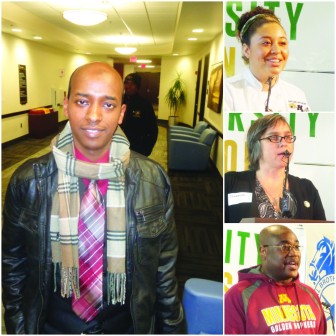
Management increases have outpaced those of ‘the people you don’t hear about’
Nearly 20 “frontline” University of Minnesota workers testified February 6 at a forum held at the school’s Coffman Union before three state legislators: Minnesota Senators Jeff Hayden and Patricia Torres Ray, and State Representative Rena Moran. The U of M’s non-faculty workers say they “feel ignored and disrespected” and want school administration to seriously address the current wage gap. All told the lawmakers that they love working for the U but also complained about stagnant wages.
According to AFSCME Local 3800, which represents U of M clerical workers, since 2008 mid- and upper-level management staff pay increases have been “significantly outpacing” those of hourly staff — management increases of 14 percent compared to between 9-11 percent for clerical, technical and healthcare workers.
The 2014 U of M employee head count shows that the number of faculty, staff and administrative positions has almost doubled since 2003: 3,709 faculty, 3,543 professional employees and 2,005 administrative workers. The number of workers of color (Black, Asian, Latino and Native American) also has grown, but according to Mary Lou Iroegbu, who has worked at the U for over 20 years, “I have not seen the [number of] people of color increase during my time at the Humphrey School,” based on what she has observed in experience at the university.
“We do the behind the scenes work” at the university, says AFSCME Local 3800 President Cherrene Horazuk. “Nearly half of the unionized workforce at the U earns below a living wage.”
University employee Mike Johnson says he has worked there for nearly 16 years. He and fellow “essential employees” are expected to report for work even “when the University shuts down and the streets are snowed in,” he pointed out. “We’re here every day.
“We are the least paid people but some of the hardest workers. We are the people you don’t hear about,” explained Johnson.
“I work for survival, not for [making a] living. I have a wife and four kids,” said Ethiopian-born Nasser Nur, who has worked at the school since 2007. He told the MSR after his testimony that there are 50-75 Muslim workers, and they all would like to get holiday pay for Ramadan. “I am speaking on behalf of them,” added Nur. “I don’t mind if I come on Christmas Day [and work]. I [just] want the day off, not the whole week.”
“I am one of eight kids, and I am helping my mother support our family,” said Sophia Benrud. “When I started here a year ago, I was so excited…and [thought how] amazing it would be to work at the U. [But] I found that my location is chaos. I have had many issues. I’ve had four paychecks that have come up short, and I have had issues with management. It is exhausting being treated as a second-class citizen.”
“Our members are living paycheck to paycheck,” continued Horazuk, who pointed out that nearly 40 percent of her union members work second jobs. Nur reports that he takes care of his children while his wife works a part-time job because they can’t afford daycare.
“The first few years were fine,” added Johnson. “Then as time went along and as we started negotiating contracts, things took a turn for the worst,” such as pay freezes and benefits cut, added Johnson.
In response to a request from the MSR for comments from the university, Julie Christensen, assistant public relations director, emailed, “The employees of the University of Minnesota are the foundation of our success. We work hard every day to ensure they have a quality work environment and receive fair compensation. That includes engaging in frequent discussions with faculty and staff about a range of issues.
“Just last week, President Kaler and senior leaders participated in a Conversation to Action event at which they had the opportunity to talk about workplace issues and other topics of interest to our students, faculty and staff. We are committed to continuing these conversations and working in partnership with all parties to ensure that the U of M is an excellent place to learn, teach and work.”
After the forum, Rep. Moran told the MSR, “I am so saddened to hear the stories” of the U of M workers. “When I think of the University of Minnesota, I think of a university that is working from a place of living-wage jobs.”
The only Black state representative added that she would question school officials when they seek more state funding. “When tuition here at the U continues to rise, I don’t know where the money is going to. Clearly it’s not going to the employees here. It would not be right if I do not raise the concerns that I heard here at the Capitol.”
Neighborhood Organizing for Change [NOC] was among several local organizations and campus groups that co-sponsored last week’s U of M workers forum. “A lot of the facts presented shocked me,” said NOC Field Director Mike Griffin.
“There’s a huge discrepancy between frontline workers, who have only two weeks of parental leave, but these administrators are getting six weeks after they have a child or adopt a child. Hopefully we can continue to push more equitable worker rights both statewide and here in Minneapolis,” said Griffin.
“We are here in solidarity with the workers,” said Whose Diversity? member Rahsaan Mahadeo.
The U of M workers want the University administration “to close the gap between haves and have nots within its own workforce,” concluded Horazuk. “Our jobs are disregarded and our voices are not heard or valued. The University should commit to be an excellent employer, not just an excellent research institution.”
Charles Hallman welcomes reader responses to challman@spokesman-recorder.com
